 |
NEW YORK (April 17, 2020) - Hospitalman Daniel Ivanik, a surgical technologist,
establishes a sterile field in which to stage medical tools prior to a
surgical procedure aboard the hospital ship USNS Comfort (T-AH-20). Comfort
cares for critical and non-critical patients without regard to their COVID-19
status. Comfort is working with Javits New York Medical Station as an integrated
system to relieve the New York City medical system, in support of U.S.
Northern Command's Defense Support of Civil Authorities as a response to
the COVID-19 pandemic. U.S. Navy photo by Mass Communication Specialist
2nd Class Sara Eshleman. (Released) |
 |
NORFOLK (March 23, 2020) - U.S. Coast Guardsmen from the Coast Guard Sector Virginia Prevention Department inspect the engine room of the Military Sealift Command hospital ship USNS Comfort (T-AH-20) at Naval Station Norfolk, Virginia, March 23, 2020, before its departure to New York to assist in the response to COVID-19. The Coast Guard is required to inspect the ship for any hazards to health or the environment prior to it getting underway from the pier. U.S. Coast Guard photo. (Released) |
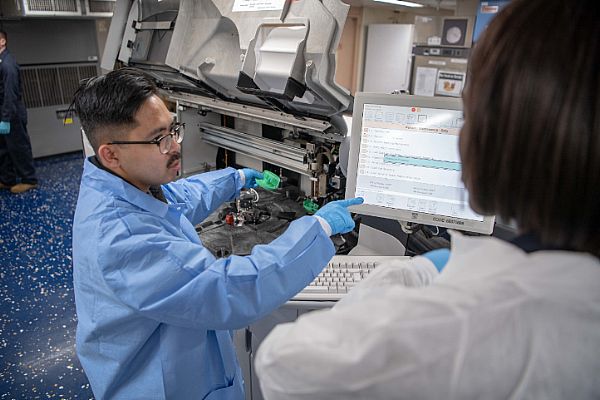 |
PACIFIC OCEAN (March 26, 2020) - Hospital Corpsman 2nd Class Rey Cesar
Madera, left, from Laurel, Md., and Hospital Corpsman 3rd Class Courtney
Dunn, from Waldorf, Md., conduct periodic maintenance on a chemistry analyzer
aboard Military Sealift Command hospital ship USNS Mercy (T-AH-19), March
26, 2020. Mercy deployed in support of the nation's COVID-19 response efforts,
and will serve as a referral hospital for non-COVID-19 patients currently
admitted to shore-based hospitals. This allows shore base hospitals to
focus their efforts on COVID-19 cases. One of the Department of Defense's
missions is Defense Support of Civil Authorities. DoD is supporting the
Federal Emergency Management Agency, the lead federal agency, as well as
state, local and public health authorities in helping protect the health
and safety of the American people. U.S. Navy photo by Mass Communication
Specialist 2nd Class Erwin Jacob Miciano. (Released) |
 |
PACIFIC OCEAN (March 26, 2020) - Hospital Corpsman 1st Class Ma Charissa
Caayao, from Silver Spring, Md., confirms white and red blood cell counts
on a test sample aboard the Military Sealift Command hospital ship USNS
Mercy (T-AH-19), March 26, 2020. Mercy deployed in support of the nation's
COVID-19 response efforts, and will serve as a referral hospital for non-COVID-19
patients currently admitted to shore-based hospitals. This allows shore
base hospitals to focus their efforts on COVID-19 cases. One of the Department
of Defense's missions is Defense Support of Civil Authorities. DoD is supporting
the Federal Emergency Management Agency, the lead federal agency, as well
as state, local and public health authorities in helping protect the health
and safety of the American people. U.S. Navy photo by Mass Communication
Specialist 2nd Class Erwin Jacob Miciano. (Released) |
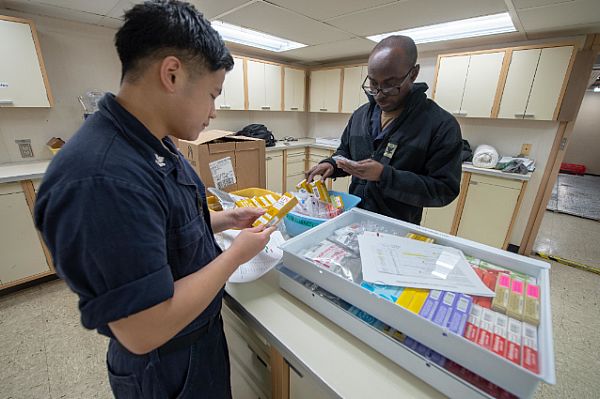 |
PACIFIC OCEAN (March 25, 2020) - Hospital Corpsman 2nd Class Benjamin Ong,
from Bremerton, Wash., and Hospital Corpsman 3rd Class Jude Dumfeh, from
Lafayette, Ind., conduct inventory in emergency medicine carts aboard the
hospital ship USNS Mercy (T-AH-19), March 25, 2020. Mercy deployed in support
of the nation's COVID-19 response efforts, and will serve as a referral
hospital for non-COVID-19 patients currently admitted to shore-based hospitals.
This allows shore base hospitals to focus their efforts on COVID-19 cases.
One of the Department of Defense's missions is Defense Support of Civil
Authorities. DoD is supporting the Federal Emergency Management Agency,
the lead federal agency, as well as state, local and public health authorities
in helping protect the health and safety of the American people. U.S. Navy
photo by Mass Communication Specialist 2nd Class Erwin Jacob Miciano. (Released) |
 |
PACIFIC OCEAN (March 25, 2020) - Hospital Corpsman 2nd Class Andrew Bouges,
a surgical technician assigned to the Military Sealift Command hospital
ship USNS Mercy (T-AH-19), loads surgical equipment onto a cart to be sterilized,
March 25, 2020. Mercy deployed in support of the nation's COVID-19 response
efforts, and will serve as a referral hospital for non-COVID-19 patients
currently admitted to shore-based hospitals. This allows shore base hospitals
to focus their efforts on COVID-19 cases. One of the Department of Defense's
missions is Defense Support of Civil Authorities. DoD is supporting the
Federal Emergency Management Agency, the lead federal agency, as well as
state, local and public health authorities in helping protect the health
and safety of the American people. U.S. Navy photo by Mass Communication
Specialist Seaman Luke Cunningham. (Released) |
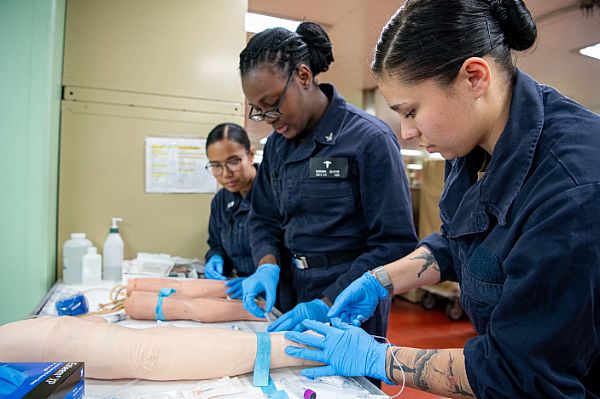 |
PACIFIC OCEAN (March 25, 2020) - Sailors assigned to the Military Sealift
Command hospital ship USNS Mercy (T-AH-19) practice administering an IV
needle during a venipuncture training, March 25, 2020. Mercy deployed in
support of the nation's COVID-19 response efforts, and will serve as a
referral hospital for non-COVID-19 patients currently admitted to shore-based
hospitals. This allows shore base hospitals to focus their efforts on COVID-19
cases. One of the Department of Defense's missions is Defense Support of
Civil Authorities. DoD is supporting the Federal Emergency Management Agency,
the lead federal agency, as well as state, local and public health authorities
in helping protect the health and safety of the American people. U.S. Navy
photo by Mass Communication Specialist 2nd Class Abigayle Lutz. (Released) |
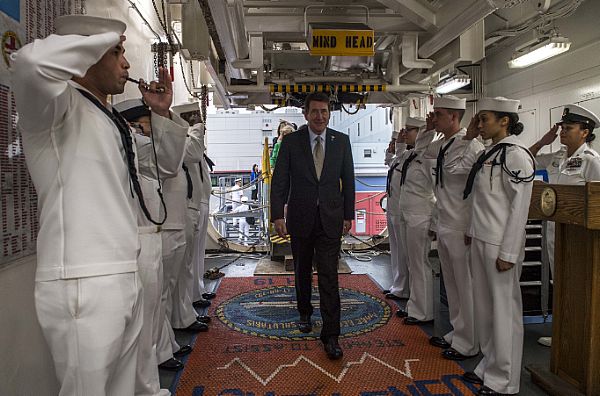 |
TOKYO, Japan (June 16, 2018) - U.S. Ambassador to Japan William F. Hagerty
IV, center, crosses the quarterdeck of the Military Sealift Command hospital
ship USNS Mercy (T-AH-19) to tour the ship and attend the big top reception.
Mercy is making port visits to Yokosuka and Tokyo to promote relationships
between U.S. Navy Sailors and Japanese citizens through cultural exchange
and bilateral training. U.S. Navy photo by Mass Communication Specialist
2nd Class Kelsey L. Adams. (Released) |
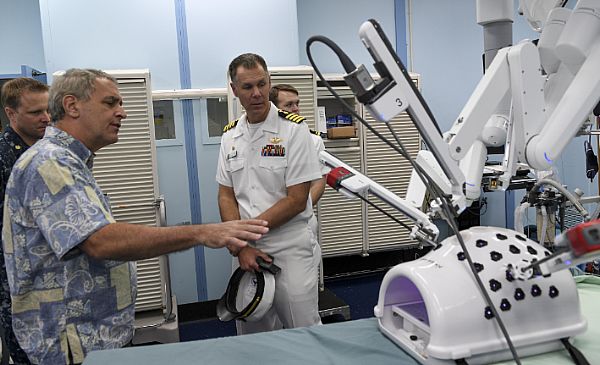 |
NAVAL BASE GUAM (March 18, 2018) - U.S. Ambassador to the Federated States
of Micronesia Robert Annan Riley III, left, and Capt. Peter Roberts, commanding
officer of Military Sealift Command hospital ship USNS Mercy (T-AH-19),
discuss the capabilities of a Da Vinci Xi surgical robot during a tour
of Mercy. Mercy is deployed in support of Pacific Partnership 2018 (PP18).
PP18's mission is to work collectively with host and partner nations to
enhance regional interoperability and disaster response capabilities, increase
stability and security in the region, and foster new and enduring friendships
across the Indo-Pacific Region. Pacific Partnership, now in its 13th iteration,
is the largest annual multinational humanitarian assistance and disaster
relief preparedness mission conducted in the Indo-Pacific. U.S. Navy photo
by Mass Communication Specialist 2nd Class Kelsey L. Adams. (Released) |
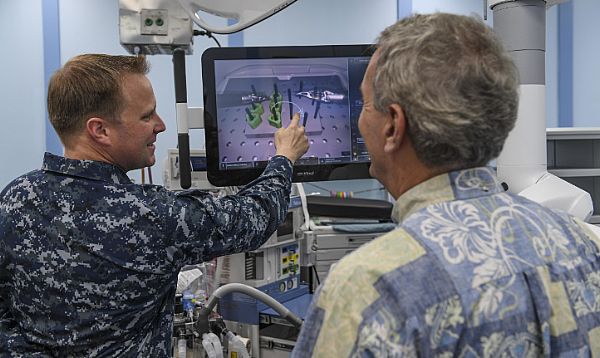 |
NAVAL BASE GUAM (March 18, 2018) - Lt. Cmdr. Kyle Gadbois, left, lead surgeon for the Da Vinci Xi Surgical Robot aboard the Military Sealift Command hospital ship USNS Mercy (T-AH-19), explains how a training simulation for the Da Vinci Robot works to U.S. Ambassador to the Federated States of Micronesia Robert Annan Riley III during a ship tour of Mercy. Mercy is deployed in support of Pacific Partnership 2018 (PP18). PP18's mission is to work collectively with host and partner nations to enhance regional interoperability and disaster response capabilities, increase stability and security in the region, and foster new and enduring friendships across the Indo-Pacific Region. Pacific Partnership, now in its 13th iteration, is the largest annual multinational humanitarian assistance and disaster relief preparedness mission conducted in the Indo-Pacific. U.S. Navy photo by Mass Communication Specialist 2nd Class Kelsey L. Adams. (Released) |
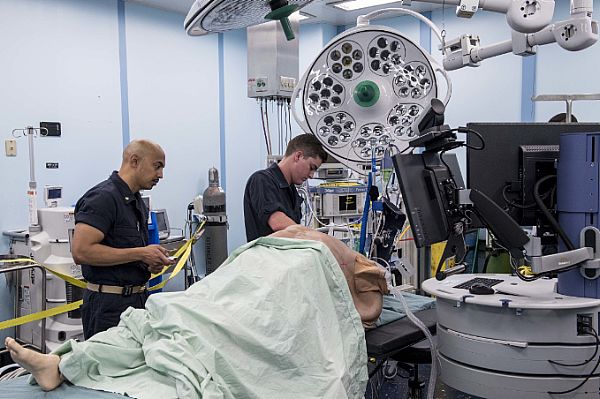 |
PACIFIC OCEAN (March 9, 2018) - Lt. Cmdr. Art Ambrosio, left, observes
as Hospitalman John Meeks conducts a cricothyroidostomy on a mock patient
during a procedural mentorship scenario aboard the U.S. Navy hospital ship
USNS Mercy (T-AH-19). Mercy is deployed in support of Pacific Partnership
2018, whose mission is to work collectively with host and partner nations
to enhance regional interoperability and disaster response capabilities,
increase stability and security in the region, and foster new and enduring
friendships across the Indo-Pacific Region. U.S. Navy photo by Mass Communication
Specialist 2nd Class Kelsey L. Adams. (Released) |
 |
PACIFIC OCEAN (June 10, 2015) - Civilian Mariner Ryan Ische, 3rd assistant
engineer, checks valves and gauges aboard the Military Sealift Command
hospital ship USNS Comfort (T-AH-20) during Continuing Promise 2015. Continuing
Promise is a U.S. Southern Command-sponsored and U.S. Naval Forces Southern
Command/U.S. 4th Fleet-conducted deployment to conduct civil-military operations
including humanitarian-civil assistance, subject matter expert exchanges,
medical, dental, veterinary and engineering support and disaster response
to partner nations and to show U.S. support and commitment to Central and
South America and the Caribbean. U.S. Army photo by Pfc. Tomarius Roberts.
(Released) |
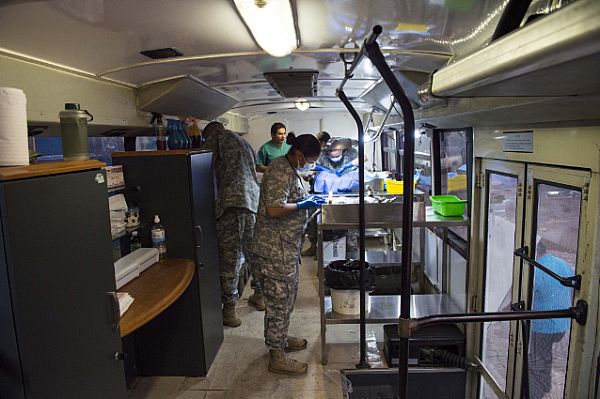 |
COLN, Panama (May 30, 2015) - Army veterinarians and veterinary technicians
assigned to the Military Sealift Command hospital ship USNS Comfort (T-AH-20)
work with a local veterinarian to spay and neuter dogs and cats at a mobile
veterinary clinic during Continuing Promise 2015. Continuing Promise is
a U.S. Southern Command-sponsored and U.S. Naval Forces Southern Command/U.S.
4th Fleet-conducted deployment to conduct civil-military operations including
humanitarian-civil assistance, subject matter expert exchanges, medical,
dental, veterinary and engineering support and disaster response to partner
nations and to show U.S. support and commitment to Central and South America
and the Caribbean. U.S. Navy photo by Mass Communication Specialist Seaman
Deven Leigh Ellis. (Released) |
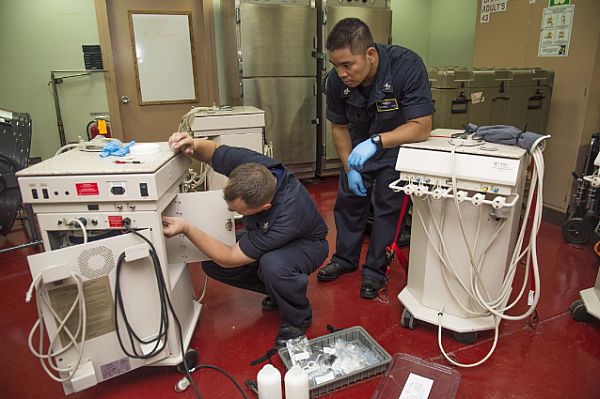 |
CARIBBEAN SEA (May 15, 2015) - Hospital Corpsman 2nd Class Randy Nash,
assigned to the Military Sealift Command hospital ship USNS Comfort (T-AH-20),
and Hospital Corpsman 1st Class Christopher Pinon, assigned to Walter Reed
National Military Medical in Center Bethesda, Md., conduct maintenance
on dental equipment during Continuing Promise 2015. Continuing Promise
is a U.S. Southern Command-sponsored and U.S. Naval Forces Southern Command/U.S.
4th Fleet-conducted deployment to conduct civil-military operations including
humanitarian-civil assistance, subject matter expert exchanges, medical,
dental, veterinary and engineering support and disaster response to partner
nations and to show U.S. support and commitment to Central and South America
and the Caribbean. U.S. Navy photo by Mass Communication Specialist 2nd
Class Brittney Cannady. (Released) |
 |
PACIFIC OCEAN (Aug 28, 2012) - Civil Service Mariner Pete Jimenez prepares a static voltage regulator to be installed in the engine room aboard the Military Sealift Command hospital ship USNS Mercy (T-AH-19). Mercy is transiting back to San Diego after completing a four and a half month mission after participating in Pacific Partnership 2012. Pacific Partnership, an annual U.S. Pacific Fleet humanitarian and civic assistance mission now in its seventh year, brings together U.S. military personnel, host and partner nations, non-government organizations and international agencies to build stronger relationships and develop disaster response capabilities throughout the Asia-Pacific region. U.S. Navy photo by Mass Communication Specialist 2nd Class Roadell Hickman. (Released) |
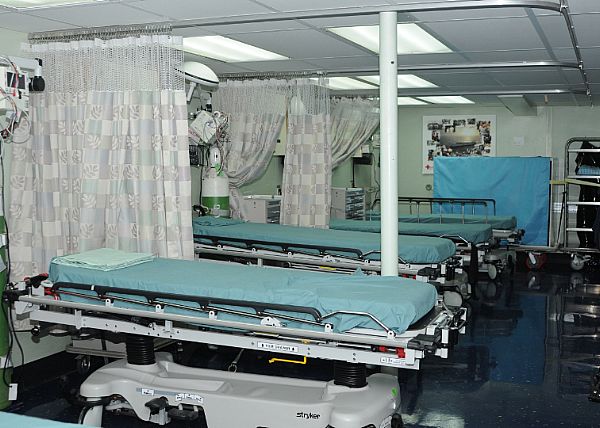 |
SANTA RITA, Guam (May 23, 2012) - Beds inside the pre-operative area aboard
the Military Sealift Command hospital ship USNS Mercy (T-AH-19) during
Pacific Partnership 2012. Pacific Partnership is an annual U.S. Pacific
Fleet humanitarian and civic assistance mission designed to work by, with
and through host and partner nations, non-government organizations and
international agencies to build partnerships and a collective ability to
respond to natural disasters. U.S. Navy photo by JoAnna Delfin. (Released) |
 |
SANTA RITA, Guam (May 23, 2012) - Beds in the causality receiving area
aboard the Military Sealift Command hospital ship USNS Mercy (T-AH-19)
during Pacific Partnership 2012. Pacific Partnership is an annual U.S.
Pacific Fleet humanitarian and civic assistance mission designed to work
by, with and through host and partner nations, non-government organizations
and international agencies to build partnerships and a collective ability
to respond to natural disasters. U.S. Navy photo by JoAnna Delfin. (Released) |
 |
SANTA RITA, Guam (May 23, 2012) - A CT scanner room aboard the Military Sealift Command hospital ship USNS Mercy (T-AH-19) during Pacific Partnership 2012. Pacific Partnership is an annual U.S. Pacific Fleet humanitarian and civic assistance mission designed to work by, with and through host and partner nations, non-government organizations and international agencies to build partnerships and a collective ability to respond to natural disasters. U.S. Navy photo by JoAnna Delfin. (Released) |
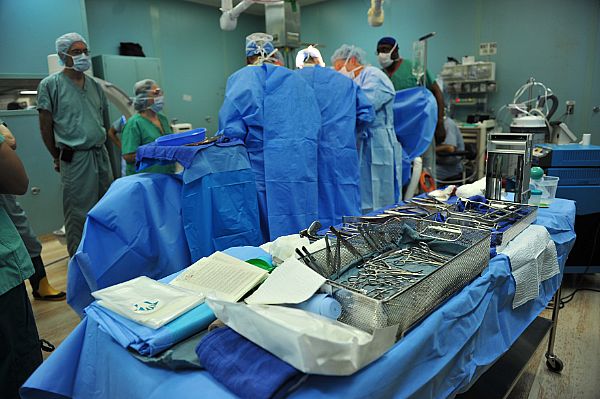 |
PORT-AU-PRINCE, Haiti (Aug. 26, 2011) - Volunteer orthopedic trauma surgeons
from Project Hope perform an operation on a Haitian patient aboard the
Military Sealift Command hospital ship USNS Comfort (T-AH-20) during Continuing
Promise 2011. Continuing Promise is a five-month humanitarian assistance
mission to the Caribbean, Central and South America. U.S. Air Force photo
by Staff Sgt. Courtney Richardson. (Released) |
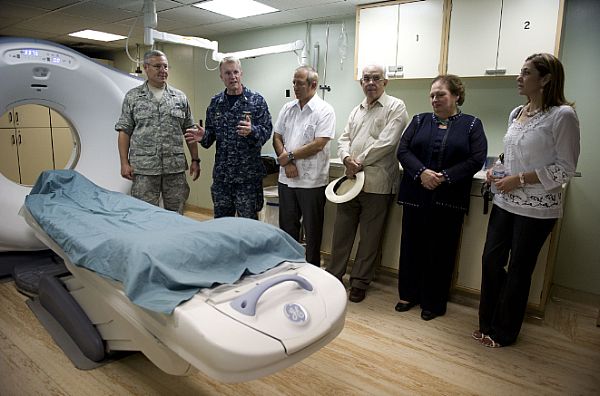 |
ACAJUTLA, El Salvador (July 19, 2011) - Capt. David Weiss, commanding officer of the medical treatment facility aboard the Military Sealift Command hospital ship USNS Comfort (T-AH-20), gives a tour of the CT scan room aboard the ship to Sigfrido Reyes, president of the Legislative Assembly of El Salvador, third from right, and Mari Carmen Aponte, U.S. ambassador to El Salvador, and other visitors during a Continuing Promise 2011 port visit. Continuing Promise is a five-month humanitarian assistance mission to the Caribbean, Central and South America. U.S. Navy photo by Mass Communication Specialist 2nd Class Jonathen E. Davis. (Released) |
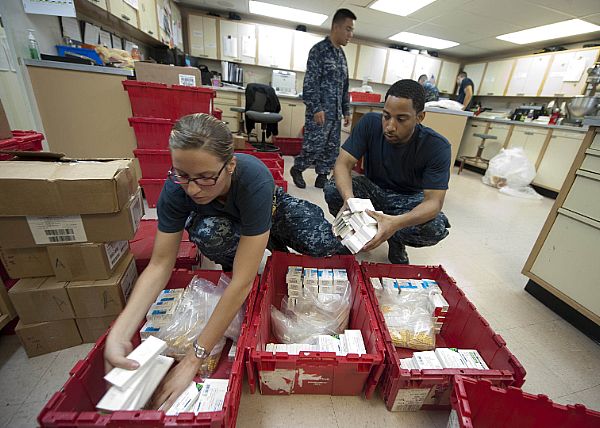 |
PACIFIC OCEAN (June 15, 2011) - Hospital Corpsman 3rd Class Eric Crump,
from Modesto, Calif., helps Lt. Laura Modafferi, from New Hope, Pa., with
packing bins of medication in the pharmacy aboard the Military Sealift
Command hospital ship USNS Comfort (T-AH-20) during Continuing Promise
2011. Continuing Promise is a five-month humanitarian assistance mission
to the Caribbean, Central and South America. U.S. Air Force photo by Staff
Sgt. Alesia Goosic. (Released) |
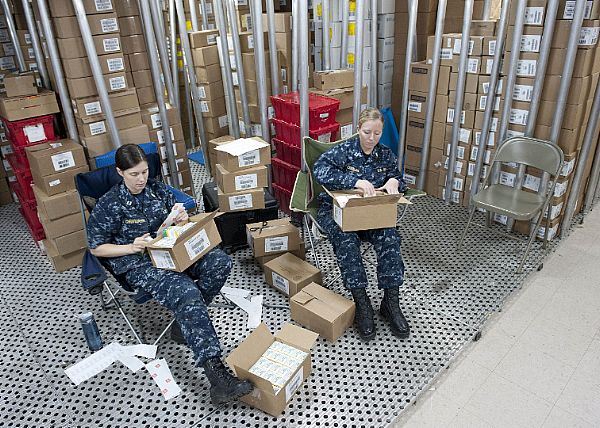 |
PACIFIC OCEAN (June 15, 2011) - Lt. Meaghan Christopher, left, from Akron,
Ohio, and Lt. Rachel Ackerman, from Deerfield Beach, Fla., label medication
in the pharmacy aboard the Military Sealift Command hospital ship USNS
Comfort (T-AH-20) during Continuing Promise 2011. Continuing Promise is
a five-month humanitarian assistance mission to the Caribbean, Central
and South America. U.S. Air Force photo by Staff Sgt. Alesia Goosic. (Released) |
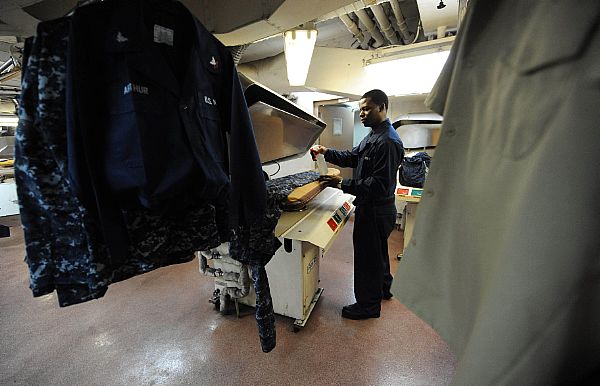 |
PACIFIC OCEAN (June 1, 2011) - Ship's Serviceman Seaman Ryan Swinton, from
West Palm Beach, Fla., presses uniforms in the ship's laundry room aboard
the Military Sealift Command hospital ship USNS Comfort (T-AH-20) during
Continuing Promise 2011. Continuing Promise is a five-month humanitarian
assistance mission to the Caribbean, Central and South America. U.S. Air
Force photo by Staff Sgt. Alesia Goosic. (Released) |
 |
PACIFIC OCEAN (June 1, 2011) - Ship's Serviceman 2nd Class Jerome Lewis-Tinsley,
from New York, presses uniforms in the ship's laundry room aboard the Military
Sealift Command hospital ship USNS Comfort (T-AH-20) during Continuing
Promise 2011. Continuing Promise is a five-month humanitarian assistance
mission to the Caribbean, Central and South America. U.S. Air Force photo
by Staff Sgt. Alesia Goosic. (Released) |
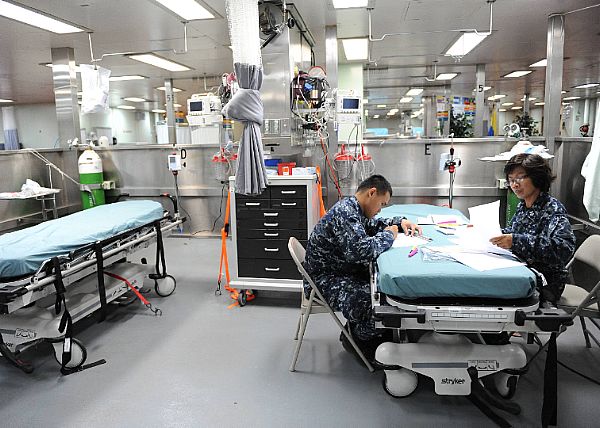 |
MANTA, Ecuador (May 24, 2011) - Hospital Corpsman 1st Class Florence Pacrem,
right, and Hospital Corpsman 2nd Class Marvin Silvosa review patient records
aboard the Military Sealift Command hospital ship USNS Comfort (T-AH-20)
during Continuing Promise 2011. Continuing Promise is a five-month humanitarian
assistance mission to the Caribbean, Central and South America. U.S. Air
Force photo by Staff Sgt. Alesia Goosic. (Released) |
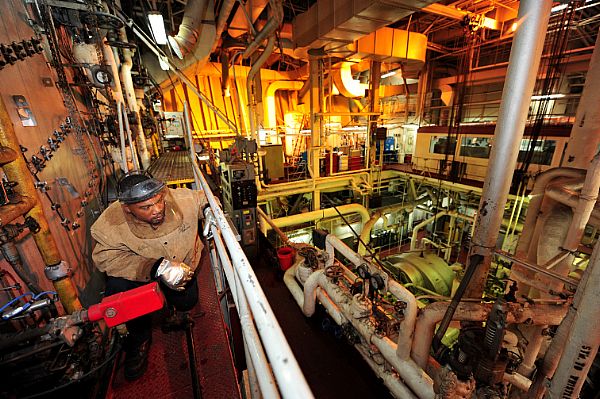 |
PAITA, Peru (May 4, 2011) - Engine Utility Willie Grant, one of more than
70 civil service mariners aboard the Military Sealift Command hospital
ship USNS Comfort (T-AH-20), looks down on the engine compartment aboard
the ship. Comfort is deployed in support of Continuing Promise 2011, a
five-month humanitarian assistance mission to Central and South America
and the Caribbean. U.S. Air Force photo by Staff Sgt. Alesia D. Goosic.
(Released) |
 |
ATLANTIC OCEAN (Oct. 12, 2007) - Mass Communication Specialist 3rd Class
Tyler Jones walks through the engine room of Military Sealift Command hospital
ship USNS Comfort (T-AH-20) while preparing for his board to earn his enlisted
surface warfare specialist qualification pin. Comfort is completing a four-month
humanitarian deployment to Latin America and the Caribbean providing medical
treatment to patients in a dozen countries. U.S. Navy photo by Mass Communication
Specialist 2nd Class Steven King. (RELEASED) |
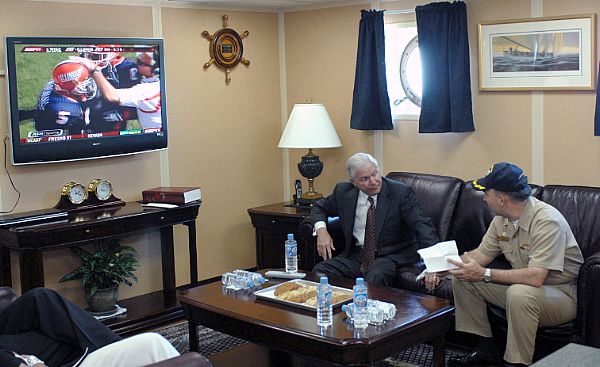 |
ATLANTIC OCEAN (Oct. 6, 2007) - U.S. Secretary of Defense Robert M. Gates
speaks with mission commander, Capt. Bob Kapcio, aboard the Military Sealift
Command hospital ship USNS Comfort (T-AH-20), after arriving aboard Comfort
off the coast of Suriname for a tour. Comfort is on a four-month humanitarian
deployment to Latin America and the Caribbean providing medical treatment
to patients in a dozen countries. U.S. Navy photo by Mass Communication
Specialist 2nd Class Steven King. (RELEASED) |
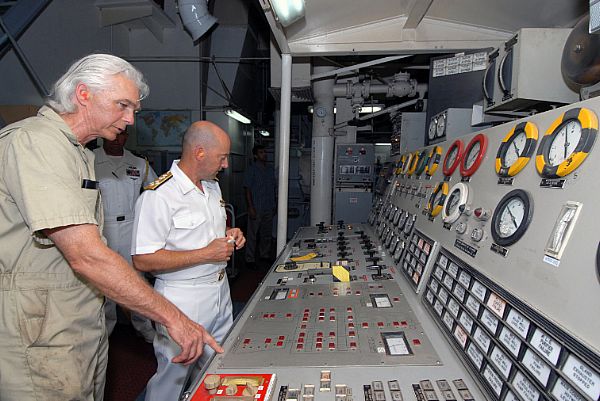 |
PORT-AU-PRINCE, Haiti (Sept. 4, 2007) - Civil service mariner Douglas Puritis,
chief engineer aboard Military Sealift Command (MSC) hospital ship USNS
Comfort (T-AH-20), guides Adm. James Stavridis, commander of U.S. Southern
Command, through the ships engineering spaces while anchored off the coast
of Haiti. Comfort is on a four-month humanitarian deployment to Latin America
and the Caribbean providing medical treatment to patients in a dozen countries.
U.S. Navy photo by Mass Communication Specialist 2nd Class Joshua Karsten.
(RELEASED) |
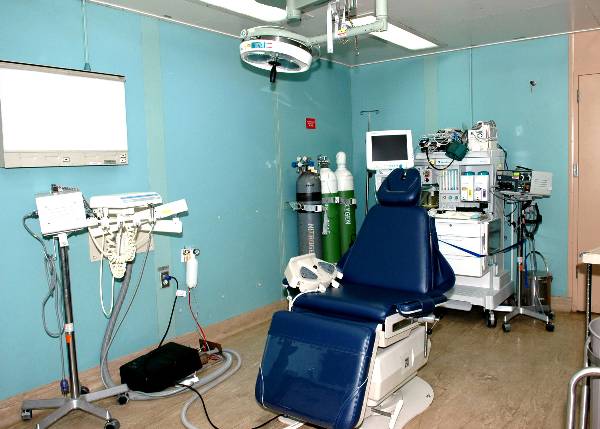 |
Pacific Ocean (May 9, 2006) - The Military Sealift Command (MSC) hospital ship USNS Mercy (T-AH-19) is equipped with two dental surgery rooms that can be used in an emergency as regular operating rooms. Like all U.S. Naval forces Mercy is able to rapidly respond to a range of situations on short notice. Mercy is uniquely capable of supporting medical and humanitarian assistance needs and is configured with special medical equipment and a robust multi-specialized medical team who can provide a range of services ashore as well as aboard the ship. The medical staff is augmented with an assistance crew, many of whom are part of non-governmental organizations, which have significant medical capabilities. U.S. Navy photo by Photographer's Mate 2nd Class Erika N. Jones. (RELEASED) |
 |
Pacific Ocean (May 9, 2006) - The Military Sealift Command (MSC) hospital
ship USNS Mercy (T-AH-19) is equipped with four dental chairs where routine
dental work can be done. Like all U.S. Naval forces Mercy is able to rapidly
respond to a range of situations on short notice. Mercy is uniquely capable
of supporting medical and humanitarian assistance needs and is configured
with special medical equipment and a robust multi-specialized medical team
who can provide a range of services ashore as well as aboard the ship.
The medical staff is augmented with an assistance crew, many of whom are
part of non-governmental organizations, which have significant medical
capabilities. U.S. Navy photo by Photographer's Mate 2nd Class Erika N.
Jones. (RELEASED) |
 |
Pacific Ocean (May 5, 2006) - An X-Ray machine located aboard Military Sealift Command (MSC) hospital ship USNS Mercy (T-AH-19). The Mercy crew will provide general and ophthalmology surgery, basic medical evaluation and treatment, preventive medicine treatment, dental screenings and treatment, optometry screenings, eyewear distribution, public health training and veterinary services as requested by the host nations. Mercy is on a five-month deployment to areas of Southeast Asia and the Pacific Islands where its crew and several health and civic related organizations will provide humanitarian assistance and conduct various community projects. U.S. Navy photo by Journalist Seaman Apprentice Mike Leporati. (RELEASED) |
 |
Pacific Ocean (May 02, 2006) - A look at the Physical therapy room aboard the Military Sealift Command (MSC) hospital ship USNS Mercy (T-AH-19). The physical therapy room is used to help patients recover physically from various injuries. Mercy is on a five-month deployment to areas of Southeast Asia and the Pacific Islands where its crew and several health and civic related organizations will provide humanitarian assistance and conduct various community projects. U.S. Navy photo by Photographer's Mate 3rd Class Timothy F. Sosa. (RELEASED) |
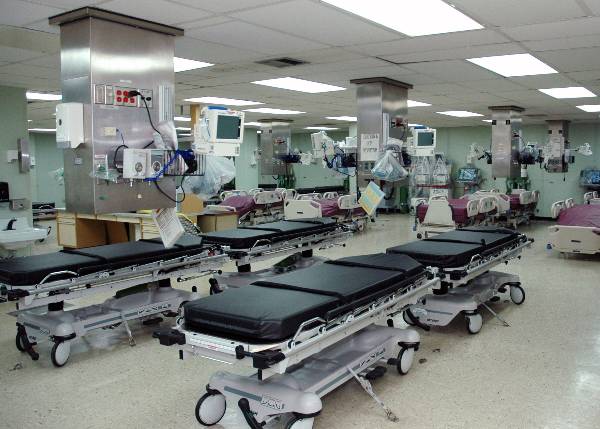 |
Pacific Ocean (May 2, 2006) - A look at the Intensive Care Unit (ICU) aboard Military Sealift Command (MSC) hospital ship USNS Mercy (T-AH-19). People requiring intensive care includes those after major surgery, with severe head trauma, life-threatening acute illness, respiratory insufficiency, coma, homodynamic insufficiency, and severe fluid imbalance or with the failure of one or more of the major organ systems. Mercy is on a five-month deployment to areas of Southeast Asia and the Pacific Islands where its crew and several health and civic related organizations will provide humanitarian assistance and conduct various community projects. U.S. Navy photo by Photographer's Mate 3rd Class Timothy F. Sosa. (RELEASED) |
 |
Pacific Ocean (May 2, 2006) - A look at the Intensive Care Unit (ICU) aboard the Military Sealift Command (MSC) hospital ship USNS Mercy (T-AH-19). People requiring intensive care includes those after major surgery, with severe head trauma, life-threatening acute illness, respiratory insufficiency, coma, homodynamic insufficiency, and severe fluid imbalance or with the failure of one or more of the major organ systems. Mercy is on a five-month deployment to areas of Southeast Asia and the Pacific Islands where its crew and several health and civic related organizations will provide humanitarian assistance and conduct various community projects. U.S. Navy photo by Photographer's Mate 3rd Class Timothy F. Sosa. (RELEASED) |
 |
Pacific Ocean (May 2, 2006) - A look at the Casualty Reception (CASREC) area aboard Military Sealift Command (MSC) hospital ship USNS Mercy (T-AH-19). CASREC is for patient administration and tracking. Mercy is on a five-month deployment to areas of Southeast Asia and the Pacific Islands where its crew and several health and civic related organizations will provide humanitarian assistance and conduct various community projects. U.S. Navy photo by Photographer's Mate 3rd Class Timothy F. Sosa. (RELEASED) |
 |
Pacific Ocean (May 2, 2006) - A look at the Casualty Reception (CASREC) area aboard the Military Sealift Command (MSC) hospital ship USNS Mercy (T-AH-19). CASREC is for patient administration and tracking. Mercy is on a five-month deployment to areas of Southeast Asia and the Pacific Islands where its crew and several health and civic related organizations will provide humanitarian assistance and conduct various community projects. U.S. Navy photo by Photographer's Mate 3rd Class Timothy F. Sosa. (RELEASED) |
 |
Indian Ocean (Apr. 11, 2005) - Culinary Specialist 2nd Class Ronald Dario,
right, and Hospitalman Seaman Oliver San Agustin serves lunch to Governor
of North Sumatra, Rizal Nurdin and Tentera Nasional Indonesia Army Commander
of Nias, Indonesia Disaster Relief Task Force, Brig. Gen. Afrizal Tanjung,
during their visit to the Military Sealift Command (MSC) hospital ship
USNS Mercy (T-AH-19). At the request of the government of Indonesia, Mercy
and the MSC combat stores ship USNS Niagara Falls (T-AFS-3) are on station
off the coast of Nias, providing assistance as determined appropriate and
necessary with earthquake disaster relief efforts and provide medical assistance
to those in need. U.S. Navy photo by Photographer's Mate 2nd Class Sandra
M. Palumbo. (RELEASED) |
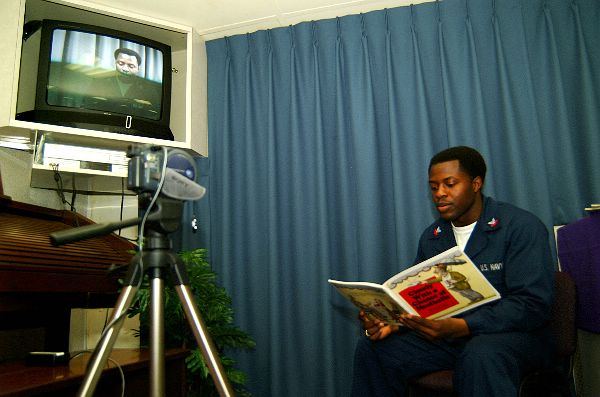 |
Indian Ocean (Feb. 15, 2005) - Personnelman 2nd Class Kennedy James reads
in front of a video camera as part of the Uniting Through Reading program
aboard the Military Sealift Command (MSC) hospital ship USNS Mercy (T-AH-19).
The Uniting Through Reading Program gives deployed parents the opportunity
to read to their kids back home. Mercy is serving as an enabling platform
to assist humanitarian operations ashore in ways that host nations and
international relief organization find useful. Mercy is currently off the
waters of Indonesia in support of Operation Unified Assistance, the humanitarian
relief effort to aid the victims of the tsunami that struck Southeast Asia.
U.S. Navy photo by Journalist 3rd Class Issac Needleman. (RELEASED) |
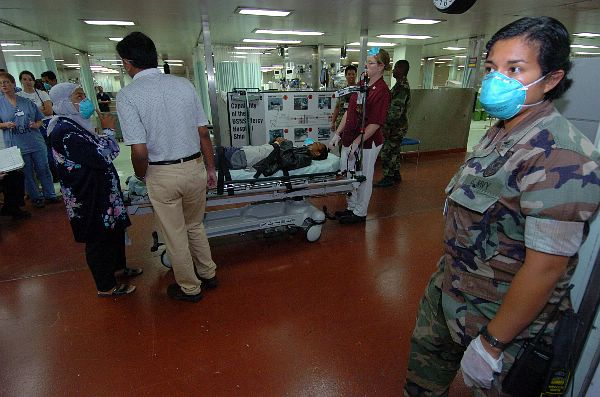 |
Indian Ocean (Feb. 8, 2005) - Master-at-Arms 2nd Class Odra Roach, right, maintains security as an interpreter speaks with the family member of an Indonesian patient brought aboard the Military Sealift Command (MSC) hospital ship USNS Mercy (T-AH-19) from the University Hospital in Banda Aceh, Sumatra, Indonesia, to receive medical care from military and non-governmental organization "Project Hope" medical personnel. Mercy will serve as an enabling platform to assist humanitarian operations ashore in ways that host nations and international relief organization find useful. Mercy is currently off the waters of Indonesia in support of Operation Unified Assistance, the humanitarian relief effort to aid the victims of the tsunami that struck Southeast Asia. U.S. Navy photo by Photographer's Mate 3rd Class Rebecca J. Moat (RELEASED) |
 |
Aboard USNS Comfort (T-AH-20) Apr. 25, 2003 Crew members take time to get
a bite to eat on the mess decks of USNS Comfort (T-AH-20). Comfort is one
of two hospital ships operated by Military Sealift Command and is designed
to provide emergency, on-site care for U.S. combatant forces deployed in
war or other operations. USNS Mercy (T-AH-19) and Comfort each contain
12 fully-equipped operating rooms, a 1,000 bed hospital facility, digital
radiological services, a diagnostic and clinical laboratory, a pharmacy,
an optometry lab, a cat scan and two oxygen producing plants. Both hospital
ships are converted San Clemente-class super tankers. Comfort set sail
for New York City and provided housing, laundry, food, medical and other
services to volunteers and rescue personnel for nearly three weeks in the
wake of the terrorist attack on the World Trade Center. Comfort was activated
again in December 2002 and sailed to the Arabian Gulf to support Operation
Iraqi Freedom, the multi-national coalition effort to liberate the Iraqi
people, eliminate Iraqs weapons of mass destruction, and end the regime
of Saddam Hussein. U.S. Navy photo by Photographer's Mate 1st Class Shane
T. McCoy. (RELEASED) |
 |
Aboard USNS Comfort (T-AH-20) April 25, 2003 -- USNS Comfort's (T-AH-20)
halls are as wide and long as a shore based hospital, which makes it easy
to transport patients to different areas of the ship. Comfort is one of
two hospital ships operated by Military Sealift Command and is designed
to provide emergency, on-site care for U.S. combatant forces deployed in
war or other operations. USNS Mercy (T-AH-19) and Comfort each contain
12 fully-equipped operating rooms, a 1,000 bed hospital facility, digital
radiological services, a diagnostic and clinical laboratory, a pharmacy,
an optometry lab, a cat scan and two oxygen producing plants. Both hospital
ships are converted San Clemente-class super tankers. Comfort set sail
for New York City and provided housing, laundry, food, medical and other
services to volunteers and rescue personnel for nearly three weeks in the
wake of the terrorist attack on the World Trade Center. Comfort was activated
again in December 2002 and sailed to the Arabian Gulf to support Operation
Iraqi Freedom, the multi-national coalition effort to liberate the Iraqi
people, eliminate Iraqs weapons of mass destruction, and end the regime
of Saddam Hussein. U.S. Navy photo by Photographer's Mate 1st Class Shane
T. McCoy. (RELEASED) |
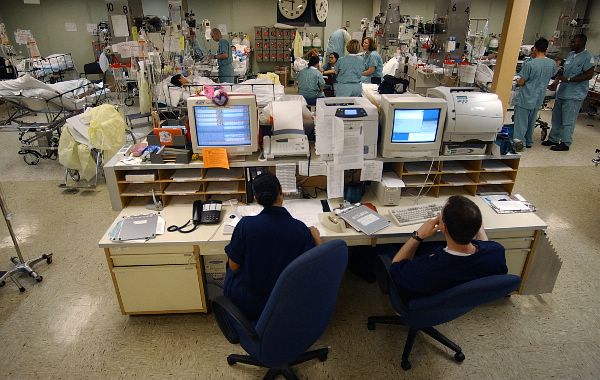 |
Aboard USNS Comfort (T-AH-20) Apr. 23, 2003 -- A central computer system
monitors the heart rates of each patient in the Intensive Care Unit (ICU)
to ensure a quick response to any problems that may occur while aboard
USNS Comfort (T-AH-20). Comfort is one of two hospital ships operated by
Military Sealift Command and is designed to provide emergency, on-site
care for U.S. combatant forces deployed in war or other operations. USNS
Mercy (T-AH-19) and Comfort each contain 12 fully-equipped operating rooms,
a 1,000 bed hospital facility, digital radiological services, a diagnostic
and clinical laboratory, a pharmacy, an optometry lab, a cat scan and two
oxygen producing plants. Both hospital ships are converted San Clemente-class
super tankers. Comfort set sail for New York City and provided housing,
laundry, food, medical and other services to volunteers and rescue personnel
for nearly three weeks in the wake of the terrorist attack on the World
Trade Center. Comfort was activated again in December 2002 and sailed to
the Arabian Gulf to support Operation Iraqi Freedom, the multi-national
coalition effort to liberate the Iraqi people, eliminate Iraqs weapons
of mass destruction, and end the regime of Saddam Hussein. U.S. Navy photo
by Photographer's Mate 1st Class Shane T. McCoy. (RELEASED) |
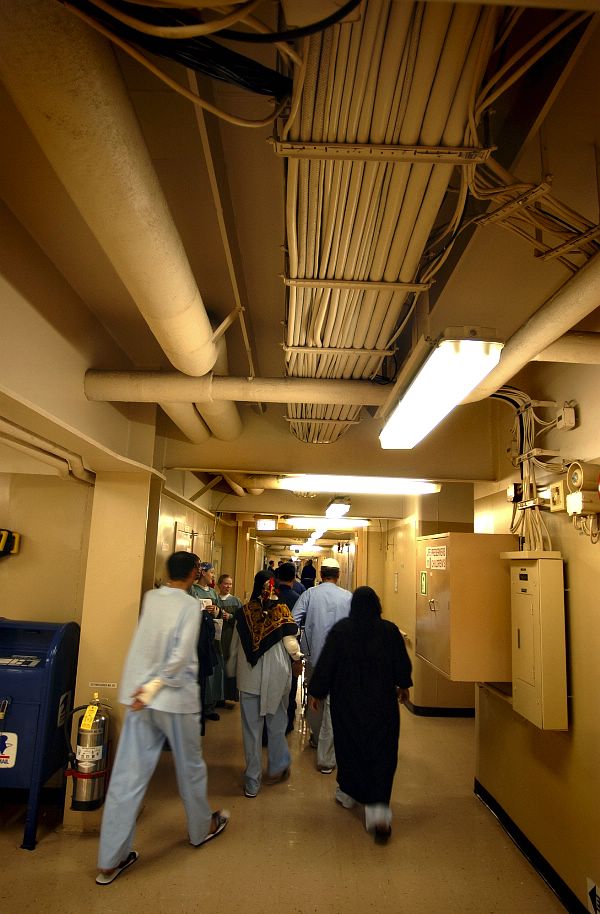 |
Aboard USNS Comfort (T-AH-20) Apr. 23, 2003 -- Patients walk the wide halls of the hospital ship USNS Comfort (T-AH-20) for a break to get some fresh air outside while they recovery from surgery and injuries incurred during Operation Iraqi Freedom. Comfort is one of two hospital ships operated by Military Sealift Command and is designed to provide emergency, on-site care for U.S. combatant forces deployed in war or other operations. USNS Mercy (T-AH-19) and Comfort each contain 12 fully-equipped operating rooms, a 1,000 bed hospital facility, digital radiological services, a diagnostic and clinical laboratory, a pharmacy, an optometry lab, a cat scan and two oxygen producing plants. Both hospital ships are converted San Clemente-class super tankers. Comfort set sail for New York City and provided housing, laundry, food, medical and other services to volunteers and rescue personnel for nearly three weeks in the wake of the terrorist attack on the World Trade Center. Comfort was activated again in December 2002 and sailed to the Arabian Gulf to support Operation Iraqi Freedom, the multi-national coalition effort to liberate the Iraqi people, eliminate Iraqs weapons of mass destruction, and end the regime of Saddam Hussein. U.S. Navy photo by Photographer's Mate 1st Class Shane T. McCoy. (RELEASED) |
 |
The Arabian Gulf (Mar. 9, 2003) -- The patient recovery room aboard the
hospital ship USNS Comfort (T-AH-20) allows 20 patients to stabilize after
receiving general anesthesia after surgery. Comfort is currently deployed
in support of Operation Enduring Freedom. U.S. Navy photo by Photographers
Mate 1st Class Kevin H. Tierney. (RELEASED) |
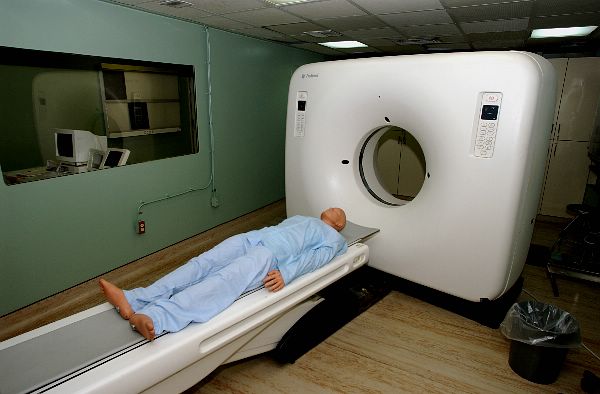 |
At sea aboard USNS Comfort (T-AH-20) Mar. 9, 2003 -- The ship's Computerized
Axial Tomography, (CAT), Scan is capable of locating and imaging internal
injuries. Comfort is currently mobilized in support of Operation Enduring
Freedom. U.S. Navy photo by Photographers Mate 1st Class Kevin H. Tierney.
(RELEASED) |